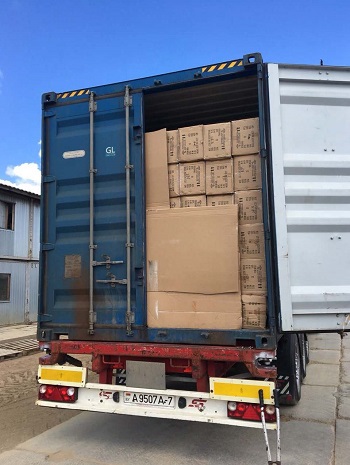A highly qualified logistics provider can bring partner’s products to the world market.
Manufacturing is developing rapidly in China. The number of enterprises producing goods that are already competing with global brands is growing there, but before the products enter the world market and become well known, they cost much less than similar advertised products. Pro-active businesses are looking for such manufacturers to use the products for their own needs, further sale on the market or to manufacture their own end products.
“The oats are cheap, but the boats...”
At the same time, Chinese manufacturers often work only on the domestic market and cannot export – they don’t have export licenses and product certificates required for buyers and carriers, the packaging does not meet transportation requirements, etc. For export customers, the situation is often as in the saying: “The oats are cheap, but the boats are expensive”. It is not only about costs, but also about working hours necessary to overcome all the obstacles, as well as the risks arising when building new partnerships and logistics chains.
As a result, someone simply refuses “cheap oats”, someone pays the price, and someone manages to reduce the costs twice. Logistic contractor’s expertise plays a key role in that.
Below is an example of how TELS specialists supported by expert’s tips of Andrej Lisovsky, Head of Railway Transportation Department, TELS Group of Companies, solve a similar task.
Case. Transporting LED-panels from China by railway
Task. The customer contacted TELS Group to import a large consignment of LED panels from China to the Republic of Belarus.
Conditions:
- the supplier in China is not an exporter – they don’t have export licenses and the required certificates, they cannot prepare export documentation for their products;
- the customer has never imported from China;
- the cargo is fragile and expensive.
Andrej Lisovsky: “This order was special because the customer had never imported anything from China to Belarus. At the same time, the products were quite expensive, about 370 thousand dollars for two containers of LED-panels for illumination in a business center. As the consignor was not a verified supplier and the customer imported such cargoes for the first time, the latter suggested that we should perform door-to-door transportation”.
Import Scheme – logistic and legal
The customer excluded air transportation option because of the high cost; sea transportation was too long and risky. The best option was the delivery by rail.
 Andrej Lisovsky: "Railway transportation from China is 1.5-2 times more expensive than by sea, but if the cargo value and the contract price are big, the logistics expenses increase the production cost insignificantly. At the same time, the speed of transportation increases about 2 times. Safety of goods transported by railway is higher than by sea – besides unforeseen delays, the container ship may get into a storm and the cargo may fall from it. Such incidents are quite often, while running off the track is extremely rare.”
Andrej Lisovsky: "Railway transportation from China is 1.5-2 times more expensive than by sea, but if the cargo value and the contract price are big, the logistics expenses increase the production cost insignificantly. At the same time, the speed of transportation increases about 2 times. Safety of goods transported by railway is higher than by sea – besides unforeseen delays, the container ship may get into a storm and the cargo may fall from it. Such incidents are quite often, while running off the track is extremely rare.”
To simplify the process for the customer and minimize their participation in organizational processes, TELS contracted transportation by railway and acted as a consignee at the station.
Andrej Lisovsky: “When organizing railway transportation, we can act as a consignor or consignee. What advantages does it bring to the customer? They don’t need to sign a contract with the railway and participate in the transportation process (sign numerous documents, pay related expenses, receive cargo at the station), the cargo is delivered directly to customer’s warehouse.”
The problem with export licenses (the Chinese manufacturer did not have them) was solved by TELS’s agent in China that had the required license and acted as a consignor.
Document collection and certification
Andrej Lisovsky: "Documents (invoices, packing lists, certificates of origin, etc.) are usually prepared by the consignor, sometimes the customer, not a transport company, helps them. In our case, neither the supplier, nor the customer could do this. We prepared the certificate of origin and almost all the other documents ourselves – some documents were prepared for the consignor as templates to be filled in and signed, some documents required only customer’s and supplier’s signatures”.
Loading of goods
The customer was especially concerned about cargo safety – the goods were fragile, and supplier’s ability to ensure quality loading and reliable securing of cargo in the container were put in question. So the customer asked TELS to organize the loading of the goods.
Andrej Lisovsky: “We calculated the option implying the delivery of products to the warehouse of our agent in China where they would be loaded into containers. This option meant unreasonable expenses. We offered the customer another option to pack the goods at supplier’s warehouse under the supervision of our surveyor.
On the whole, the Chinese pack well. (It is common that goods cannot be loaded back into the container after the inspection of the Russian customs.) We convinced the customer that we would ensure quality loading and the goods would arrive undamaged. Besides, the customer received a detailed photo report from the loading site.”

Results
The customer received the cargo on time and without damage.
Thus, the transportation allowed:
- the Chinese manufacturer to reach a new level of an exporter;
- the Belarusian importer supported by a logistics contractor to develop expertise in foreign trade relations with the PRC.
This case is a vivid example of how a logistics provider not only acted as a carrier, but also became a full-fledged partner in the development of commercial success of two enterprises and contributed to the growth of global trade.